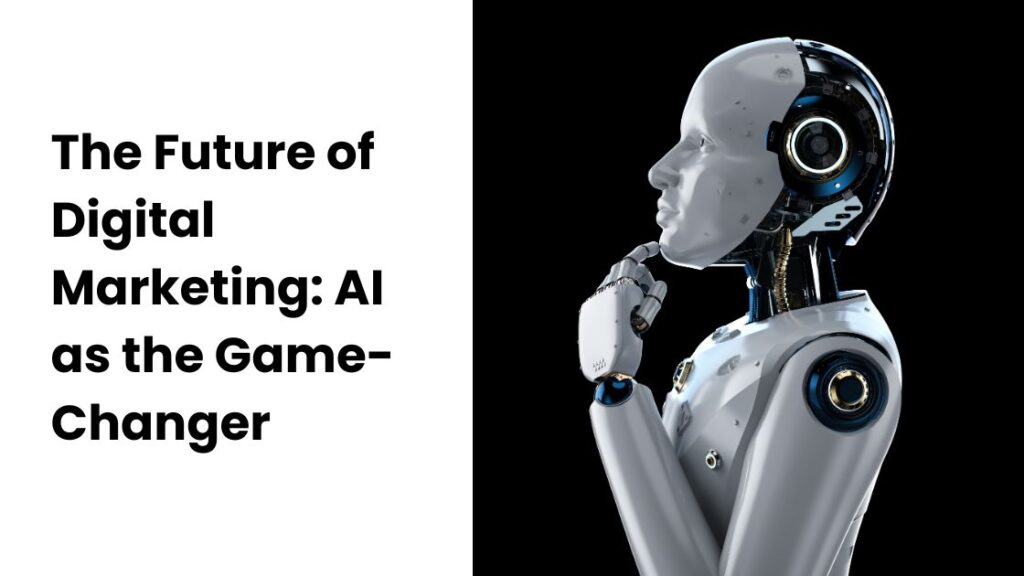Digital marketing has come a long way from its early days of banner ads and basic websites. Staying ahead of the curve is essential in the ever-evolving digital landscape. The introduction of Artificial Intelligence (AI) has emerged as a game-changer, revolutionizing the way marketers strategize and execute their campaigns.
Introduction
In the ever-evolving realm of digital marketing, understanding the future landscape is essential. The integration of AI brings forth a myriad of possibilities, from data analytics to customer engagement. Let’s delve into the various facets of how AI is reshaping the future of digital marketing.
AI's Impact on Data Analytics
The backbone of effective digital marketing lies in data analytics. AI has taken this to new heights, enabling marketers to delve deeper into consumer behavior. Through enhanced data analysis and predictive analytics, businesses can make informed decisions, tailoring their strategies to meet the ever-changing needs of their audience.
Personalization and Customer Experience
Personalization is one of the key benefits that AI offers to digital marketing. Instead of sending the same message to everyone, AI enables the creation of tailor-made content for each customer. This makes every interaction more relevant and valuable, leading to higher customer satisfaction and loyalty.
Chatbots and Customer Engagement
Chatbots have become synonymous with efficient customer service. AI-driven chatbots not only handle routine queries but also contribute to a seamless customer experience. Their ability to engage customers in real-time significantly impacts user satisfaction and brand perception.
SEO Revolution with AI
One of the main components of online success is search engine optimisation, or SEO. AI has transformed the SEO landscape, offering advanced keyword research and content optimization capabilities. Marketers can now leverage AI algorithms to understand search intent better, resulting in more targeted and effective content.
Programmatic Advertising
Automation is the future of advertising, and AI is at the forefront of this revolution. Programmatic advertising, powered by AI algorithms, streamlines the ad buying process, ensuring that ads are shown to the right audience at the right time. This not only maximizes efficiency but also improves the return on investment for advertisers.
Social Media Management with AI
Social media is a dynamic platform, and AI has found its place in content creation and scheduling. From generating engaging social media posts to automating the scheduling of content, AI simplifies the management of social media platforms, allowing marketers to focus on strategy and engagement.
Email Marketing and Automation
Email marketing is still a potent weapon in the digital marketing armoury. AI optimization in email campaigns ensures that content is tailored to individual preferences, leading to higher open and conversion rates. Automation further streamlines the process, allowing for timely and personalized communication with the audience.
E-commerce and AI Integration
In the e-commerce landscape, AI plays a pivotal role in enhancing user experience. By analyzing user behavior and preferences, AI-driven systems can recommend products tailored to individual tastes. This not only increases sales but also fosters customer satisfaction.
Data Security and AI
As the reliance on AI grows, so does the importance of data security. AI is not immune to potential vulnerabilities, and safeguarding sensitive information is paramount. Integrating AI with robust cybersecurity measures ensures the trust of customers and protects businesses from potential data breaches.
Challenges and Concerns
The integration of AI in digital marketing is not without its challenges. Ethical considerations, potential job displacement, and the need for continuous retraining are aspects that businesses must navigate. Striking a balance between innovation and ethical practices is crucial for sustained success.
The Future Landscape
Despite the challenges, the future of digital marketing with AI looks promising. Continued evolution and the emergence of new technologies will shape the landscape further. Marketers who embrace these changes and stay ahead of the curve will position themselves for success in the dynamic digital marketplace.
Case Studies
To illustrate the practical impact of AI in digital marketing, let’s explore some case studies. We’ll delve into businesses that have successfully implemented AI strategies, showcasing tangible results and highlighting best practices for others to emulate.
Preparing for the AI Shift
As AI becomes an integral part of digital marketing, marketers must prepare for the paradigm shift. Skill development is key, and staying updated on the latest AI trends is essential. Adapting to the changing landscape ensures that marketers can harness the full potential of AI for their campaigns.
Conclusion
In conclusion, the future of digital marketing is intricately linked with the rise of AI. From data analytics to customer engagement, AI is reshaping how businesses connect with their audience. Embracing this transformative technology is not just a choice but a necessity for those aiming to thrive in the digital age.
If you are interested in learning more about how AI can boost your digital marketing skills, you should join our digital marketing course in Delhi and learn how to use AI to create personalized and effective content for your customers. You will also learn how to optimize your website, analyze data, and increase conversions. This course is for anyone who wants to master digital marketing with the help of AI.
Frequently Asked Questions
AI enhances efficiency but cannot replace human creativity and strategic thinking.
Many AI tools offer affordable solutions for businesses of all sizes, allowing them to scale gradually.
Marketers should prioritize transparency, data privacy, and avoiding discriminatory practices.
Traditional methods may evolve, but a blend of AI and traditional strategies often yields the best results.
Regularly attending industry conferences, webinars, and following reputable publications can keep marketers informed.
